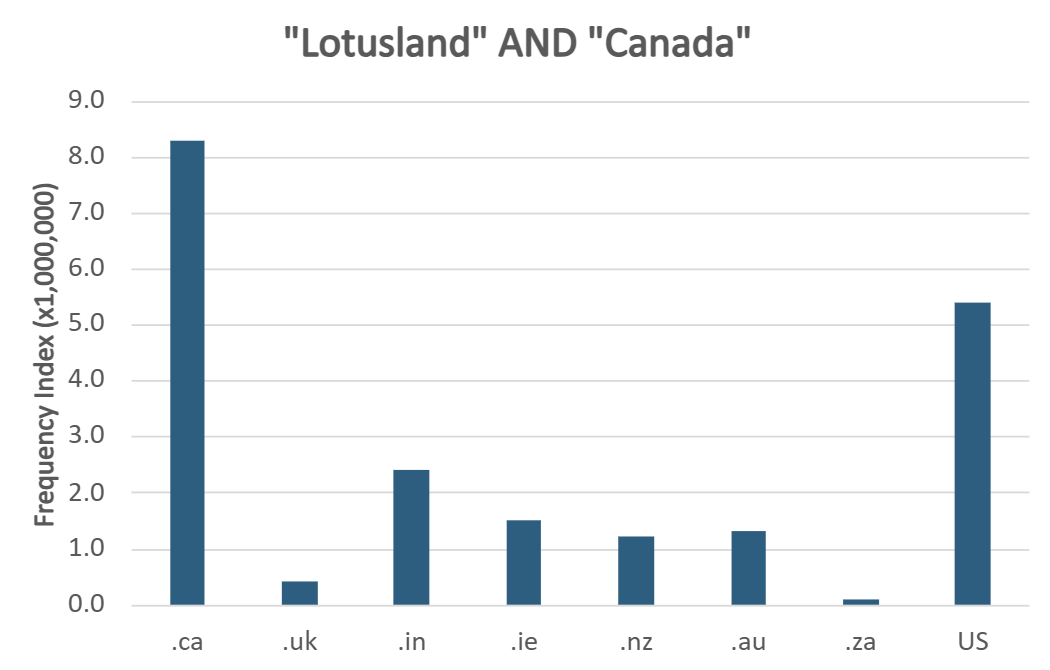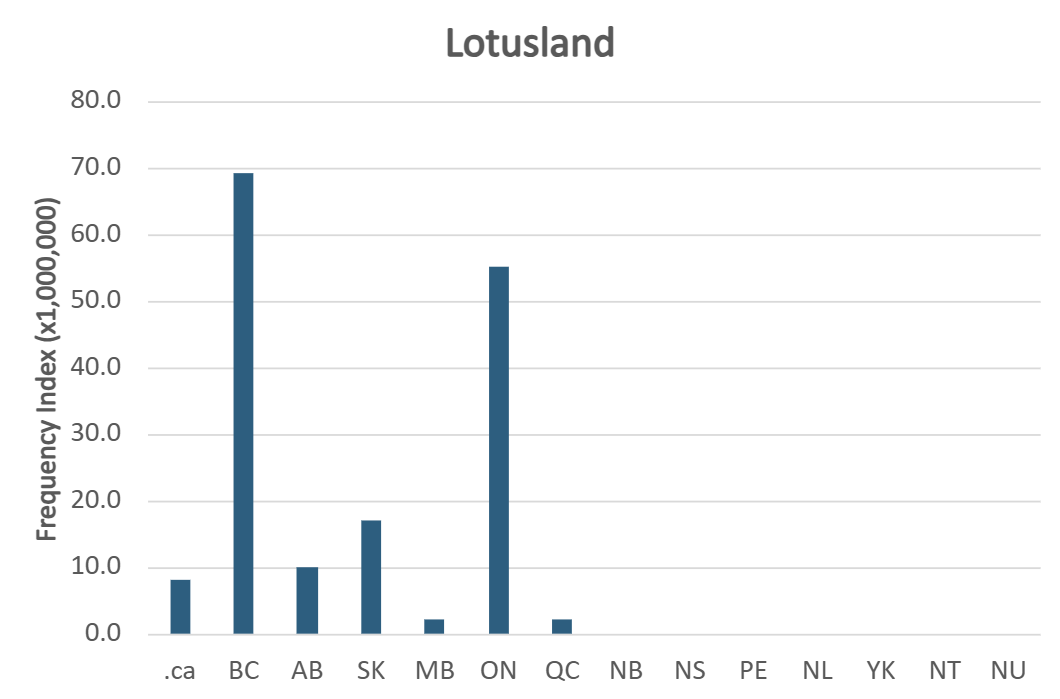Quick links
lotus land
DCHP-3 (May 2025)
Spelling variants:Lotusland, Lotus Land, Lotus land, lotusland
n. — especially Politics
in the Canadian context, a nickname for British Columbia, and often specifically Vancouver.
Type: 3. Semantic Change — In Homer's Odyssey and a poem published in 1832 by Alfred Tennyson, "The Lotos-eaters," some of Odysseus' crew visit an island and eat a delicious fruit that leaves them in a contented stupor. Tennyson's lines reference the land itself:
The term is applied to British Columbia due to its mild climate and spectacular scenery, a generally stable economy, and comparatively easy-going lifestyle (see the quotations). In more recent times, the term has come to be associated with Vancouver's reputation for lenient attitudes towards recreational drugs, marijuana in particular (see, e.g. the 2006 and 2013 quotations).
This stereotype was especially prevalent before the national legalization of cannabis in 2017-2018, when residents of Vancouver were seen as having more tolerant attitudes towards illicit drug use than people in the rest of Canada. The nickname Lotusland seems to have taken on ironic connotations of late, given Vancouver’s notorious unaffordability crisis since the turn of the 21st century and increasing gang violence (see the 2020 and the 2022 quotations). Lotusland is most frequent in Canada (Chart 1) and within the country in British Columbia and Ontario (Chart 2).
See also COD-2, s.v. "Lotus Land" (2), marked "Cdn jocular" and mentions British Columbia, Gage-5, s.v. "lotus land", marked "Cdn. Informal" and mentions British Columbia, ITP Nelson, s.v. "lotus land", and OED-3, s.v. "lotus land".
Let us swear an oath, and keep it with an equal mind,
In the hollow Lotos-land to live and lie reclined
On the hills like Gods together, careless of mankind.
The term is applied to British Columbia due to its mild climate and spectacular scenery, a generally stable economy, and comparatively easy-going lifestyle (see the quotations). In more recent times, the term has come to be associated with Vancouver's reputation for lenient attitudes towards recreational drugs, marijuana in particular (see, e.g. the 2006 and 2013 quotations).
This stereotype was especially prevalent before the national legalization of cannabis in 2017-2018, when residents of Vancouver were seen as having more tolerant attitudes towards illicit drug use than people in the rest of Canada. The nickname Lotusland seems to have taken on ironic connotations of late, given Vancouver’s notorious unaffordability crisis since the turn of the 21st century and increasing gang violence (see the 2020 and the 2022 quotations). Lotusland is most frequent in Canada (Chart 1) and within the country in British Columbia and Ontario (Chart 2).
See also COD-2, s.v. "Lotus Land" (2), marked "Cdn jocular" and mentions British Columbia, Gage-5, s.v. "lotus land", marked "Cdn. Informal" and mentions British Columbia, ITP Nelson, s.v. "lotus land", and OED-3, s.v. "lotus land".
See: la-la land
Bruce Hutchinson, a political journalist and author, is often claimed to have coined the term's connection to BC (see, e.g., the 1992 quotation). He can only be credited with popularizing the connection (see, e.g. the 1911 and 1956 quotations).
Today very offten used in names of companies, products, or shows etc. that relate to BC (see, e.g., the 2015 quotation).
Today very offten used in names of companies, products, or shows etc. that relate to BC (see, e.g., the 2015 quotation).
Quotations
1911
Finally you get to the wild bustle of Vancouver, and there they will take you to a park with gigantic trees, with the greenest and the most massive, and at the same time, delicate ferns, perhaps, in the world, and you imagine that this is Lotus land in comparison to what you have been seeing some days previously in that other British Columbia of gigantic and snow-clad or mist-hidden mountains.
1956
As happened at the last Conservative convention, the resolutions advocating conscription and universal military training came from British Columbia. Apparently, the most vocal militarists in Canada live in that lotus land along the Pacific coast.
1961
One moment you are in Malton airport surrounded by sober Torontonians, neatly briefcased; the next you are in lotus land among the wild natives. Viewed from Toronto, the West Coast does not seem too far away; but when you get on the far side of those mountains it is like being on another planet.
1968
- Victoria and Vancouver - "The former has the reputation of being the most English city in Canada, full of retired colonels and maiden aunts, while the latter offers a combination of lotus-land and gangland..."
1978
"When during the course of two recent meetings of national finance ministers only the Ontario minister of finance is shown ... is it any wonder that (a) British Columbians feel they are being ignored; (b) Ontarians feel they are the most important actors in our national life; and (c) eastern Canadians think British Columbia to be a lotus land ... inhabited by slightly odd persons who have no interest in national problems?"
1982
Only 10.6 per cent of migrants to B.C. cited the search for employment as their reason for moving to Lotusland, while 15.1 per cent attributed the move to health, climate or scenery.
Over-all, economic reasons -- including taxes lower than those in some other provinces -- accounted for the migration of 26 per cent of people moving to B.C., compared to 50 percent for Alberta, Statistics Canada said.
And people who move to B.C. also placed more importance on companionship than did their Alberta counterparts.
1988
MPs from nine provinces and both Territories, regardless of party, all agree on at least this one point: British Columbians are insufferable when they talk about the weather. Take PC Ted Schellenberger of Nanaimo, who rose in the Commons the other day to announce the arrival of spring: "As we all know, spring arrived many weeks ago in supernatural British Columbia. . . . It is sunny and 15 degrees above in Lotus Land today. Here in Ottawa it is minus 15 degrees [...]"
1989
Such regional differences are under pressure from standard Canadian just as Canadian English is under pressure from American English.
But the outcome isn't foreordained. The residents of Lotus Land have a long history of being different from other Canadians just as all of us have a long history of being different from the Yanks.
1992
If outsiders saw the reclusive, slightly eccentric Mr. Hutchison as a typical British Columbian, that was appropriate, for he had defined the province's standoffish attitude.
"Lotusland," a frequent term of endearment for B.C., was a Hutchsion coinage. He thought Tennyson's poem The Lotus-Eaters, with its lines about Ulysses' sailors seduced into a drugged paradise and never wanting to roam the seas again, perfectly described his Vancouver Island home: "No one who has entered here ever wanted to leave again."
2001
It was Bruce Hutchison, who achieved international recognition as a brilliant journalist while refusing all his life to leave his province [BC], who invented the label "Lotus Land," derived from the Greek mythology of the lotus-eaters. The ancient Greeks ate the fruit from the lotus tree, containing the property of making people forget their country and friends and remaining idle in the lotus land. Doesn't that sound like B.C.? Of course.
2001
The term "Lotus Land" (from Alfred, Lord Tennyson's poem about Ulysses' sailors dreaming about a South Sea paradise) was adopted by that sterling journalist, the late Bruce Hutchison, to describe the otherworldly aspects of life in British Columbia. Apart from its connection with the Pacific Scandal, this province has had a full complement of opprobrious episodes that have often reflected B.C.'s devil-may-care attitude.
2006
He credits Alberta for his work ethic, a trait he says is less of a priority for mellow West Coasters. "People in B.C., Vancouver tend to be more lackadaisical about things," he says. "I think that's noticeable. They call it Lotus Land for a reason. People smoke too much pot and everything out here is a little slow, which is fine, but at some point you have to step up and do the work, too."
2007
This year, the Aleutian Low has been combining with a strong feed of moisture from the Hawaiian islands that we call the Pineapple Express to produce a greater number of wind and rainstorms than normal for Lotusland. After the rain and snow falls on B.C., chinook winds accelerate down the eastern slopes on the Rockies into southern Alberta.
2011
Following graduation, Fotheringham got a job with the Vancouver Sun, beginning a path that would see him become an ever-present figure in media for years. He used wit and wordplay in his columns, and the names he gave his targets became part of the national dictionary. Vancouver became “Lotusland,” the CBC became the “Mother Corp,” and the Liberals became “the Natural Governing Party.”
2013
Many [Calgarians] take great exception to the idea that an organization based in Vancouver (or, as some correspondents prefer, "The Left Coast" or "Lotus Land") has the temerity to express opinions on an event taking place in Calgary. Vancouverites' alleged rampant use of cannabis and overconsumption of lattes feature heavily in these missives.
2015
This is Lotusland explores people and stories living in British Columbia, with a focus on Metro Vancouver, where the podcast is produced. We live in a beautiful part of the world, but separated from the rest of civilization by the Rocky Mountains, the Pacific Ocean and the American border, we're also a unique part of the world. It's that uniqueness and often simple oddness that we examine.
2020
I should have known better than to ask a Vancouver realtor how much half a million could get you in Lotusland these days.
"It's pretty easy," laughed MacDonald Realty broker Dan Scarrow. "It's a one-bedroom condo. That's what you can get for $500,000."
2022
Detectives in B.C.'s Lower Mainland were dealing with a double homicide, the latest carnage in a raging gang war for dope turf in Lotusland.
That was on March 19, 2021, when cops were called to Rathburn Dr. in suburban Richmond to investigate a house fire. When the blaze was squelched, investigators found 25-year-old Chaten and 23-year-old Joban Dhindsa dead inside.
References
- COD-2
- Gage-5
- OED-3
- ITP Nelson
Images

Chart 1: Internet Domain Search, 7 April 2023
